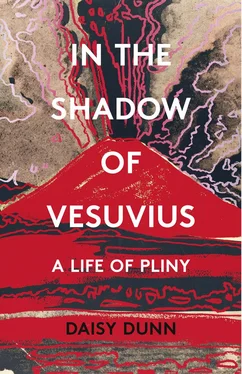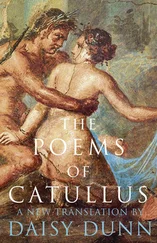After Drusus died, his brother Tiberius, who would precede Caligula as emperor from AD 14 to 37, worked hard to pacify the Germanic tribes, but was recalled before the Romans could conquer all the territory they desired around the Rhine. The most catastrophic setback came in the autumn of AD 9 when a Roman legate named Varus was leading three legions through the thick Teutoburg Forest near the River Weser. Varus fatefully put his trust in a Germanic chieftain, who had formerly served with the Roman auxiliary, only to be attacked by his tribesmen. 16The Roman legions were destroyed. Although the Romans lost the land they had gained to the east of the Rhine, they managed to create a zone of provinces beneath the Danube and had made sufficient inroads to maintain troops across the Rhineland with centres at modern Mainz and Cologne. Over the following decades, insurrections, mutinies and plundering became increasingly common among the Germanic tribes, and it was in the interest of quelling the so-called Chauci that Pliny the Elder had found himself waging a war against trees in AD 47.
The Romans at home came to know the Germans by repute. They learned that they had wild blue eyes, reddish hair, large strong frames, little tolerance of thirst and heat, but natural resistance to cold and hunger owing to their climate. 17Their tribes did not live in cities but ‘scattered and far apart, wherever a fountain or plain or grove took their fancy’. 18Pliny the Elder at least had the good fortune to be confronting ‘the very noblest of the Germans, who elect to preserve their greatness through justice’. 19The Greater Chauci lived between the Elbe and Weser rivers and the Lesser between the Weser and the Ems. As the Romans’ commander, a severe but capable man named Gnaeus Domitius Corbulo, led the triremes up the Rhine channel, the rest of the fleet proceeded through a network of estuaries and canals. 20Pliny the Elder took one look at the territory and concluded that the Chauci were ‘a miserable people’ to inhabit country so flood-prone. 21He likened them in their huts on higher ground to sailors aboard a ship and then, as the waters receded, to victims of a shipwreck.
As he and his fellow soldiers set about sinking the tribesmen’s ships, Corbulo succeeded in subduing the neighbouring tribe of the Frisians, and made after the leader of the Chauci. 22No sooner had he put him to death than he received orders from Rome to withdraw his troops to the near bank of the Rhine. 23Rome was now ruled by Claudius, son of Drusus who had died in Germania. His rise to power had come about almost by accident when, in AD 41, the Praetorian Guard murdered his nephew Caligula and supported him to take his place. Though sickly, stammering, and frequently taken for a fool, Claudius was highly astute. The last thing he wanted was to stir up war among the very tribes he hoped to pacify. The Roman empire now stretched from Hispania in the west to Pontus (north-east Turkey) and Judaea in the east, and he had ambitions of extending it further still. By the end of his rule, Claudius would have succeeded in annexing Thrace, Lycia (in southern Turkey), Noricum (Austria with some of Slovenia) and Mauretania in north Africa. In the period when Pliny the Elder was in Germania, Claudius’ attentions were firmly focused on Britain. Knowing that it would be a tremendous coup to succeed where Julius Caesar had twice failed – in conquering the ‘remotest island in the west’ – Claudius had launched an expedition to Britain in the summer of AD 43 and returned to Rome in triumph the following year. 24Although it would be another forty years before the Romans had truly conquered England and Wales, Claudius had set the process in motion.
Germania, meanwhile, remained unsettled. In around AD 51, Pliny the Elder returned to the region to quell the agitations of another tribe, the Chatti. It was probably in this period that he began writing his book On Throwing the Javelin from Horseback . Like his histories of the German Wars, the work is unfortunately lost, but presumably set out the military techniques he had learned on the battlefield. His experiences might well have commended to him the German technique of hurling javelins at close quarters over the Roman tradition of firing them at long range. 25Later, in his Natural History, Pliny the Elder provided the merest glimpse into how he might have soothed his aching limbs after these exercises. There were hot springs at nearby Mattiacum, modern Wiesbaden, where the water, he wrote, remained warm ‘for three days’. 26
Not everyone would have found military life conducive to writing, but Pliny the Elder happened to be posted under a commander who had literary ambitions of his own. Pomponius Secundus would one day be celebrated for the ‘erudition and polish’ of his plays, one of which was inspired by the story of Aeneas. 27Pliny the Elder later described him as ‘a poet and very distinguished citizen’ who was so self-restrained that he never belched. 28Although Pomponius failed to achieve war against the Chatti, he was greeted in Rome with triumphal honours, which were but ‘a fragment of his fame in the eyes of posterity, among whom the glory of his poems prevailed’. 29On visiting him at home, Pliny the Elder was impressed to find official papers in his collection dating from almost two hundred years earlier. 30These, and his experience of his command, left a lasting impression; a biography of Pomponius Secundus, written in his memory, is among Pliny the Elder’s other lost works.
Having returned from Germania, Pliny the Elder went to see Claudius put on a magnificent naval battle on a lake beside a mountain he had had bored through in central Italy. Keen to display his muscle against the backdrop of this spectacular feat of engineering, the emperor had the Roman triremes and quadriremes drawn up and boarded by an extraordinary 19,000 servicemen. Crowds from the nearest towns and from as far away as Rome arrived and filled the banks and hills ‘in their cupidity or duty to see the emperor’. 31Pliny the Elder’s eye, however, was drawn not to Claudius but to his fourth wife (and niece), the empress Agrippina the Younger, for she was dressed in a ‘cloak of woven gold without any other material’. 32Pliny the Elder never failed to notice a glint of luxury. He paused on Agrippina’s cloak as if it held a clue to her true character.
He would be among several historians to suggest that Agrippina was responsible for Claudius’ death a few years later. In the autumn of AD 54, the empress was said to have ordered Claudius’ plate of boleti (bolete, perhaps porcini) mushrooms to be poisoned because she feared he was grooming his natural son Britannicus as his successor rather than her own son Nero, whom she had had him adopt. 33Succession under the Julio-Claudian emperors was never without drama. Even the emperors who were fortunate enough to have natural sons had reason to fear the emergence of rival heirs. Pliny the Elder incorporated the rumour of Agrippina’s machinations into his encyclopaedia as little more than an illustration of the dangers of mushrooms. It was his belief that, if mushrooms were not spiked by a scheming empress or poisonous by Nature, then they could still become deadly by absorbing whatever happened to be in the soil where they sprang up. The nail from a soldier’s boot, a piece of old rag, even the breath of a snake in the soil could render a mushroom noxious as it rose ‘lighter than sea foam’ from its womb-like tunic. 34As far as Claudius’ mushrooms were concerned, the poison only spread. Agrippina’s act, Pliny the Elder quipped, gave the world a new ‘poison’ in the form of the teenage emperor Nero.
While initially Nero put on an honourable front – arranging an elaborate funeral for Claudius, abolishing some taxes and reducing others, hosting extravagant entertainments for the people – he soon lived up to Pliny the Elder’s assessment of him. 35First he had his stepbrother Britannicus poisoned. Then, after several failed attempts, he dispatched his controlling mother to her death. Then he killed his aunt. He then kicked his pregnant wife Poppaea to death when she reproached him for returning home late from the races. 36Around sixty years would pass before Suetonius recounted these murders in his Lives of Rome’s rulers, from Julius Caesar to Domitian. The Algerian-born biographer (he is thought to have come from the Romanised town of Hippo Regius) was head of the libraries at Rome and had access to the imperial archives. Even allowing for some bias in his account, it is clear that the latter part of Nero’s rule was deeply unsettled. If Pliny the Elder had hoped that he would have more freedom to pursue his literary interests after returning from his Germanic expeditions, then Nero’s impulsiveness showed him otherwise.
Читать дальше












